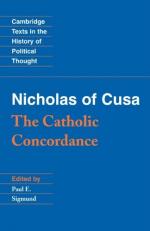|
This section contains 686 words (approx. 3 pages at 300 words per page) |

|
NICHOLAS OF CUSA (1401–1464), German canonist, Christian theologian, and philosopher. Nicholas was born at Kues (present-day Bernkastel-Kues) on the Moselle, and studied at Heidelberg, Padua, and Cologne. At the Council of Basel, with his treatise De concordantia catholica (1434), he defended conciliar authority over the pope and proposed extensive reforms consistent with this position. He later converted to the cause of the papacy. As papal legate he traveled to Constantinople to promote Christian reunification (1437), and as cardinal and bishop of Brixen, he worked throughout Germany and Bohemia on behalf of papal authority and ecclesiastical reform. During his last years in Rome, Nicholas lived simply, having used much of his income to establish the Saint Nikolas Hospital in Kues, which still contains his large personal library.
Amid this active life Nicholas wrote numerous speculative works, beginning with De docta ignorantia (Learned Ignorance; 1440). He accords intellect a central...
|
This section contains 686 words (approx. 3 pages at 300 words per page) |

|


